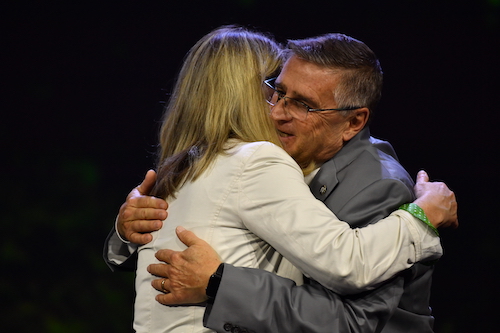“I’m home,” Portland, Ore., Local 125 member Liz Shuler told her IBEW siblings Tuesday in her first address to an International Convention since being named president of the AFL-CIO.
 |
| Secretary-Treasurer Kenneth W. Cooper embraces Shuler following her address at the convention. |
Shuler is the first woman and first IBEW member to hold the post in the federation’s 66-year history. She served as the AFL-CIO’s secretary-treasurer for 12 years before being named president by its executive council following the death of Richard Trumka last August.
Shuler reminded delegates her father was a longtime Local 125 lineman for Portland General Electric, a job which provided dignity on the job and financial security for their family. Her mother worked for the company in a clerical job, but it was a nonunion position, which did not offer her near the respect or compensation.
That showed their daughter the power of union membership and Liz Shuler joined Local 125 when hired as an organizer after graduating from college in 1992.
“Electricity is in my blood,” she said. “What I experienced and what I saw over those years is what I carry with me every single day in my work across the labor movement. I saw the union difference. I lived it.”
Shuler praised the IBEW for several initiatives, especially IBEW Strong for opening membership opportunities to traditionally underrepresented groups such as women, people of color and the LGBTQ community.
She added, however, that the brotherhood and all other unions need to seize the momentum of recent organizing wins at employers that conventional wisdom held couldn’t be organized, such as Starbucks and Amazon. Those wins have largely been driven by younger workers.
“People are fed up with the corporate greed and they’re fired up,” Shuler said. “They’re organizing unions and we have a wave of activism not seen in decades. Young people are stepping up to organize in places we haven’t seen before.”
The IBEW has had recent organizing wins at nontraditional employers, most notably at Colectivo Coffee locations in Chicago and Milwaukee.
But to sustain that momentum, organizers must be willing to try different ideas than in the past and listen to those younger workers, Shuler said.
For instance, many Starbucks workers asked customers to identify themselves as “Union Yes” when ordering on the company’s mobile app. That way employees would be required to announce aloud that an order for “Union Yes” was ready.
“That should be our charge as activists and leaders in our movements,” Shuler said. “Let’s try new things. Let’s be bold. Let’s take some risks and not be held back by the way we used to do things or fearing that something might not work. When we try new things, we bring people in.”
She also encouraged convention delegates and attendees to reach out and have more one-on-one conversations with members of their local unions. That is so critical during these times of hyper-partisanship and rampant disinformation, she said.
“We, the labor movement, are the only institution in the country that can actually bring people together,” she said. “We can access real workers. …It’s so simple but it’s about getting back to the basics, so we can break through. Talk about our shared values and our vision for the future, especially as we head into the 2022 election.”
Shuler will run for a full term at the AFL-CIO’s convention in Philadelphia next month. She served as executive assistant to then-International President Edwin D. Hill from 2005-09 before being elected the AFL-CIO’s secretary-treasurer on a ticket headed by Trumka.